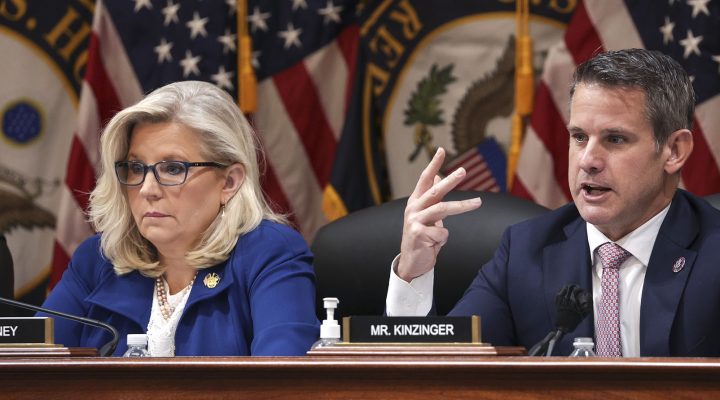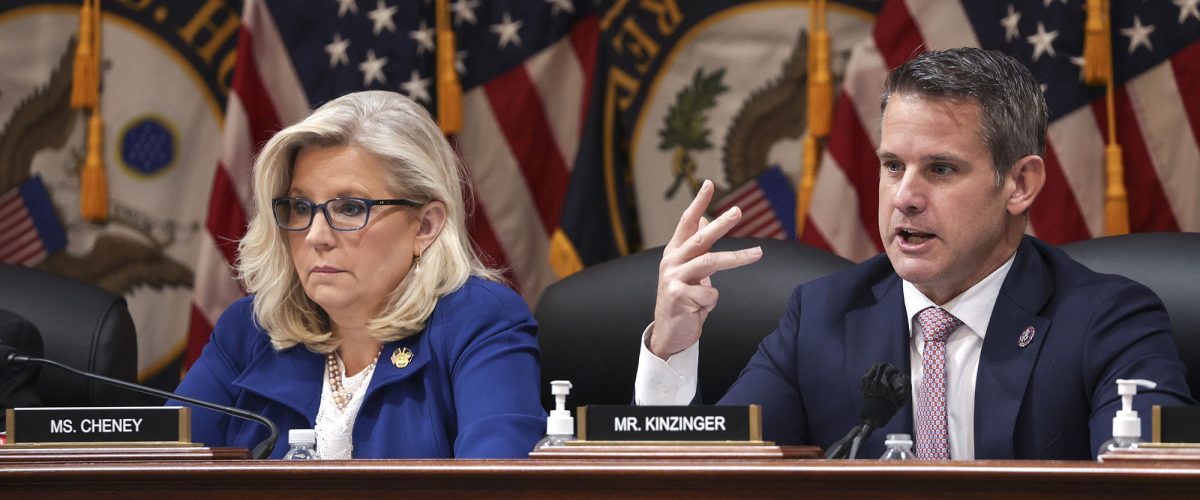Adam Kinzinger learned all about religious fundamentalism growing up at Calvary Baptist Church in Normal, Ill., and other independent fundamental Baptist congregations that practiced separation from the world, prohibited worldly pleasures and provided plentiful rules that freed true believers “from the burden of decision making.”
Kinzinger attempted mini-rebellions, such as wearing shorts to a youth group outing when all church events required long pants. Other young people were better at hiding their feelings but wound up suffering mental health issues or drug problems, he writes in his memoir, Renegade: Defending Democracy and Liberty in Our Divided Country, published Tuesday.
The six-term Republican’s time in Congress would introduce him to a form of political fundamentalism that combined religious certainties with an absolute faith in the personality cult of Donald Trump.
 “I realized why the Trumpists seemed so familiar,” he writes. “They were fundamentalists in their politics, just as people I knew as a kid were fundamentalist in their religion. … The most dangerous of Trump’s followers practiced both religious and political fundamentalism, which meant that the word of God and the word of Trump were equally motivating.”
“I realized why the Trumpists seemed so familiar,” he writes. “They were fundamentalists in their politics, just as people I knew as a kid were fundamentalist in their religion. … The most dangerous of Trump’s followers practiced both religious and political fundamentalism, which meant that the word of God and the word of Trump were equally motivating.”
Kinzinger’s rebellion against political fundamentalism required a change.
“Instead of acting as a GOP champion, I am required to act as its critic,” he writes. He voted to impeach President Trump for his role in the January 6 insurrection and served on the Congressional committee that investigated Trump’s “dereliction of duty.”
Renegade provides “the inside story of how my party and my faith have been hijacked by extremists who represent a real danger to our democracy.”
The book shows how Kinzinger’s “moderate” policies and demeanor, along with the traditional, Midwestern values he learned from family school, church, community, President Ronald Reagan and the U.S. Air Force, became political liabilities as “extremist characters became leaders of the alliance of the faithful and the political” and “rhetoric became toxic.” Opponents no longer were simply wrong, but were corrupt, pathetic, sick, incompetent or traitors.
He says political fundamentalism has been destructive for America (repeated budget battles have lowered America’s credit rating, increasing costs) and devastating for Christ’s church.
“The devil’s greatest trick has been to convince my fellow Christians to basically destroy their own reputations.”
“The devil’s greatest trick has been to convince my fellow Christians to basically destroy their own reputations,” said Kinzinger, who now lives in Houston, during a phone interview.
In the interview, Kinzinger also discussed new House Speaker Mike Johnson. He believes Johnson had been unfairly attacked for his faith in Christ but says attacks on Johnson’s role in attempting to overturn the 2020 election are on target.
“I’m worried about him,” Kinzinger said. “He’s an election denier. He tried to get me to sign on to the Texas lawsuit contesting the election. He’s a smart dude, and he knows better. I wish him luck. He needs it.”
Johnson’s first legislative proposal — to aid Israel with funds cut from the budget of the Internal Revenue Service — met with instant opposition yesterday.
Kinzinger first caught the political bug at age 6 when a Christian man his family knew ran for office.
His father modeled Christian engagement that combined compassion and conservatism, operating a local nonprofit called Home Sweet Home that served the homeless.
Kinzinger was 12 years old in 1992 when his father took him to Virginia for the Christian Coalition’s 1992 national conference. It was an “awesome” experience that shaped the youngster’s view of his calling to politics.
But in time he would trade his fundamentalist faith and politics for a more expansive approach, as he explained in the interview: “I was always stuck with this question: Is my job to basically be a pastor in a position of political leadership? Or is my job to be a man of faith in a secular position? I realized I don’t just represent the people of the same faith as me. I represent all 700,000 folks in my district. How do I show my faith while representing everyone?”
Kinzinger arrived in Congress in 2011 to legislate as he had campaigned, “not as an angry man determined to stop someone else, but as a trustworthy, decent man with a positive agenda,” he writes. “Even though I have been raised in a very conservative faith, I respected everyone’s journey.”
“The Capitol Hill characters I thought were the worst of my party were, in fact, it’s future.”
But he watched as fellow 2011 freshmen — Mike Pompeo, Mick Mulvaney, Kristi Noem, Mo Brooks, Trey Gowdy, Paul Gosar, Allen West, Joe Walsh — drank the Kool-Aid and converted to the cult of Trump, enforcing its ever-changing orthodoxies and leading its never-ending inquisitions.
“The Capitol Hill characters I thought were the worst of my party were, in fact, it’s future,” writes Kinzinger, who dishes behind-the-scenes with fellow Republican House members, including Jim Jordan, described here as “an attack dog masquerading as a representative” and a “king of obstruction” committed to “the destruction of bipartisan cooperation.”
Initially pleased by the energy of the Tea Party, Kinzinger grew frustrated as the movement fled its founding principles, embraced dominionist politicians such as Michele Bachmann and others who “hijacked it for their own purposes,” normalized extremism and promoted racism and antisemitism.
The whole time, Fox News amped up the chaos, “operating like a drug pusher” that “kept a majority of people in my party hooked with increasingly powerful stuff,” he explains.
Although he has plenty of reasons to lose hope, Kinzinger hangs in there on his core values. “The answer isn’t more anger, but an upwelling of goodness,” he writes near his memoir’s conclusion.
Politically, he’s focusing on Country First, his nonprofit created to reach “the reasonable majority” and the “politically homeless” with a call to put country above party.
Spiritually, he’s calling all believers, but especially Baptists, to get back to basics: “As a community of faith, we need to get back to our mission and to be examples to people who are lost.”
Related articles:
Johnson called ‘the most unabashedly Christian nationalist speaker in history’
‘Hour of decision’? Evangelicalism in a post-church, post-Trump era | Opinion by Bill Leonard


